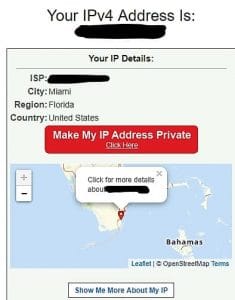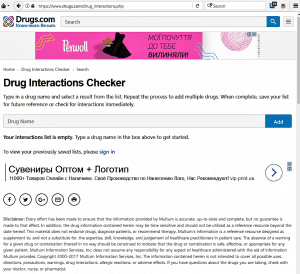Have you ever had some weird pain or itch crop up, and felt you had to Google it? Or suspected you may have a terrible disease and could not resist looking up some health-related websites for it?
Yeah, me too. And the vast majority of the time, it’s nothing serious, and we get all paranoid unnecessarily. But there’s another, perhaps worse, issue: you’re probably being tracked, and the information can be used to your detriment.
Health-Related Websites (And Others) Are Tracking You
As a Motherboard article reports, you can be quite certain that every time you visit a health-related website (or pretty much any other site), that site will inform many others about you. For example, WebMD at one point sent data about you to 34 separate sites, including “data brokers” like Experian (yes, the credit reporting company). In fact, as one study cited in the article found, 91% of the top 50 search results for almost 2,000 common diseases led to sites that tracked you in some way or other.
Some of this is for rather innocent purposes, like telling Google Analytics about your visit (which many sites, including here at The Rich Miser, use to count their visitors) (don’t worry, I don’t get your name or address or anything like that). However, other times it’s for more questionable ends, such as selling your data (including data that can be used to identify you) to corporations.
This, in turn, can potentially affect you in a number of ways. For example, you can get targeted ads based on what you search for, as one guy found out when he looked up sleep apnea and then started getting ads for devices to treat the condition. (In my experience this does happen, since I’ve looked up products and then started getting ads for them later).
Or, at least in theory, it could affect you on a job search, since, according to Cooper Quintin of the Electronic Frontier Foundation, “[a] company might get a demographic profile from one of these data brokers and use that information to decide whether or not to hire you” (as told to Motherboard).
Your ISP Can Track You
Even when a website does’t track you, your ISP (the company that provides your internet access) can. After all, every byte of web traffic to and from your computer goes through them. That means that they “…could conceivably share detailed information about a person’s Web usage that could be used to discover his or her identity” (Washington Post).
How Can I Do Private Internet Browsing?
All of this begs the question of how you can browse health-related websites (or any website, for that matter), without being tracked. Well, there’s several ways to go incognito, but a free and easy one is the TOR web browser.
via GIPHY
What Is the TOR Web Browser?
The TOR web browser is a free, private browser that allows you to surf the net in complete privacy, without being tracked (well, nothing’s 100% certain, but this gets very close). It lets you go incognito from sites that track you and from your ISP by, essentially, encrypting your communications and bouncing your signal around the world. That way, the sites you visit don’t know where you’re coming from, and your traffic just seems like a bunch of gibberish to your ISP.
You can download the TOR private browser here. You can also get browsers for mobile devices that use the TOR network, such as the Onion Browser.
Let’s see TOR in action. To do so, first I went, without TOR, to whatismyipaddress.com, which shows you a neat map of where it thinks you are. It knows I’m in Miami:
Now, let’s try again, but this time from the TOR private browser:
Whoa! It thinks I’m in Germany!
And let me test it out on the drugs.com interactions checker, a health-related website:
Judging by the lettering on the ads (Cyrillic?), they seem to think I’m in Russia! But nyet, I’m still in Miami, though now incognito.
Downsides To the TOR Web Browser
Presumably because it blocks tracking, many websites don’t like TOR and will actually block you from using it. For example, I tried to do a Google search, and I got this error message:
So, for search, one alternative is the anonymous DuckDuckGo search engine. Or, you can go directly to the website you seek, and hope it gives you access (healthcare websites drugs.com, WebMD and Mayo Clinic seem to work).
A second TOR downside is that it tends to block website elements that can be used to track you, making some sites look weird (with empty boxes and whatnot).
Third, the TOR private browser can be SLOW. Presumably because it bounces your traffic all over the world, it can be a real tortoise.
Alternatives to the TOR Web Browser for Incognito Surfing
I’ll do a more detailed post on this in the future, but a quick answer is: use a VPN and a separate browser with no extensions installed and all privacy features turned on. Don’t log into anything on that browser, including your e-mail.
Bottom Line
Being tracked when I look up health information online is very alarming to me. I don’t want everyone and their uncle to know, or think they know, about my health and about what I look up online.
To fix this, there’s more than one way to cover your tracks. However, the TOR private browser is easy and free to get, and requires no configuration or complicated technical know-how. Give it a try!
Does the sharing of your browsing habits concern you?







Hey, Miguel. I don’t do anything nefarious online (or offline, for that matter). But I do worry about my life being an open book. It’s too creepy, too 1984-like. So I’m going to give TOR a try. Thanks for alerting me and others to this tool. Like you said, it’s not 100% protection, and it does have some drawbacks, but if it reduces your digital comings and goings by 25%, it’s worth it. Cheers.
Hey Mr. Groovy! I only use TOR when looking up things where I don’t want to be tracked (mostly health-related research). It’s not something to be used all the time, but is great for when you need that extra privacy. Hope you find it useful 🙂